Quirky questions for early spring!
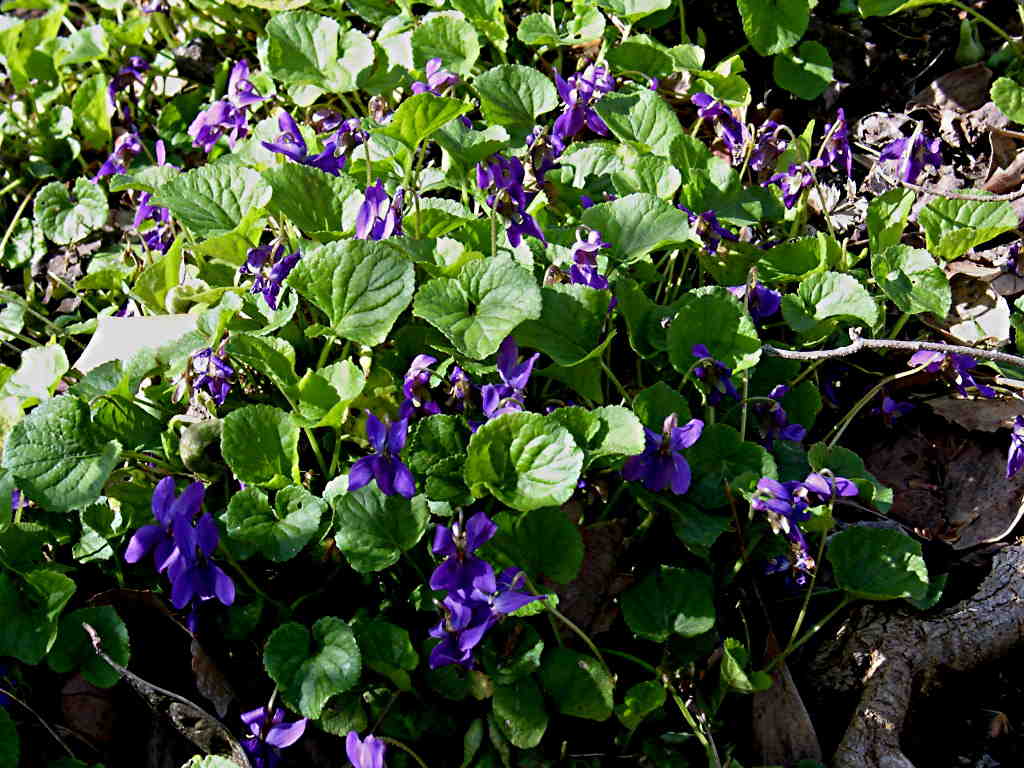 Viola odorataSweet violets, much loved for their fragrance, are common lawn invaders in the older parts of town. After these showy winter blooms, the plant begins producing seed directly in the soil.
Viola odorataSweet violets, much loved for their fragrance, are common lawn invaders in the older parts of town. After these showy winter blooms, the plant begins producing seed directly in the soil.
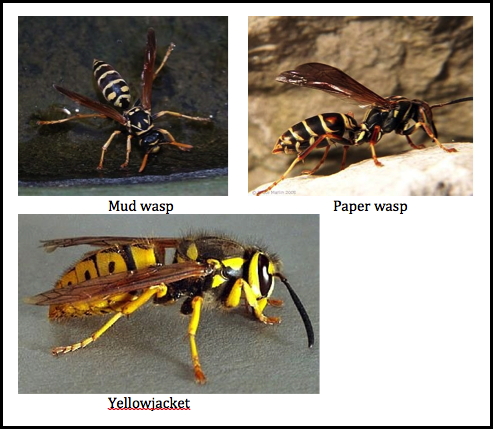 Comparing mud wasps, paper wasps, and yellowjackets. The last are aggressive. You can probably coexist peacefully with the others.
Comparing mud wasps, paper wasps, and yellowjackets. The last are aggressive. You can probably coexist peacefully with the others.
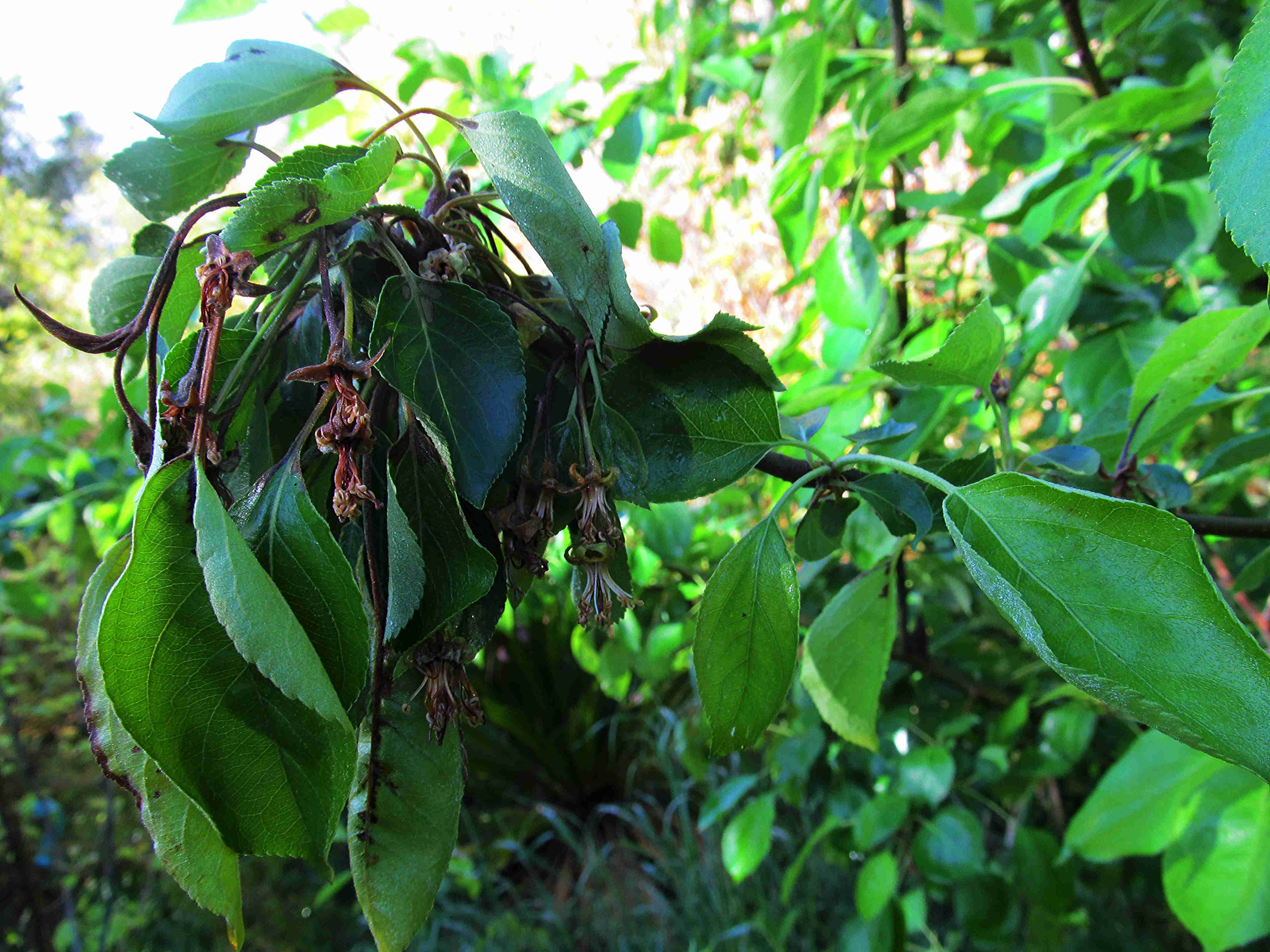
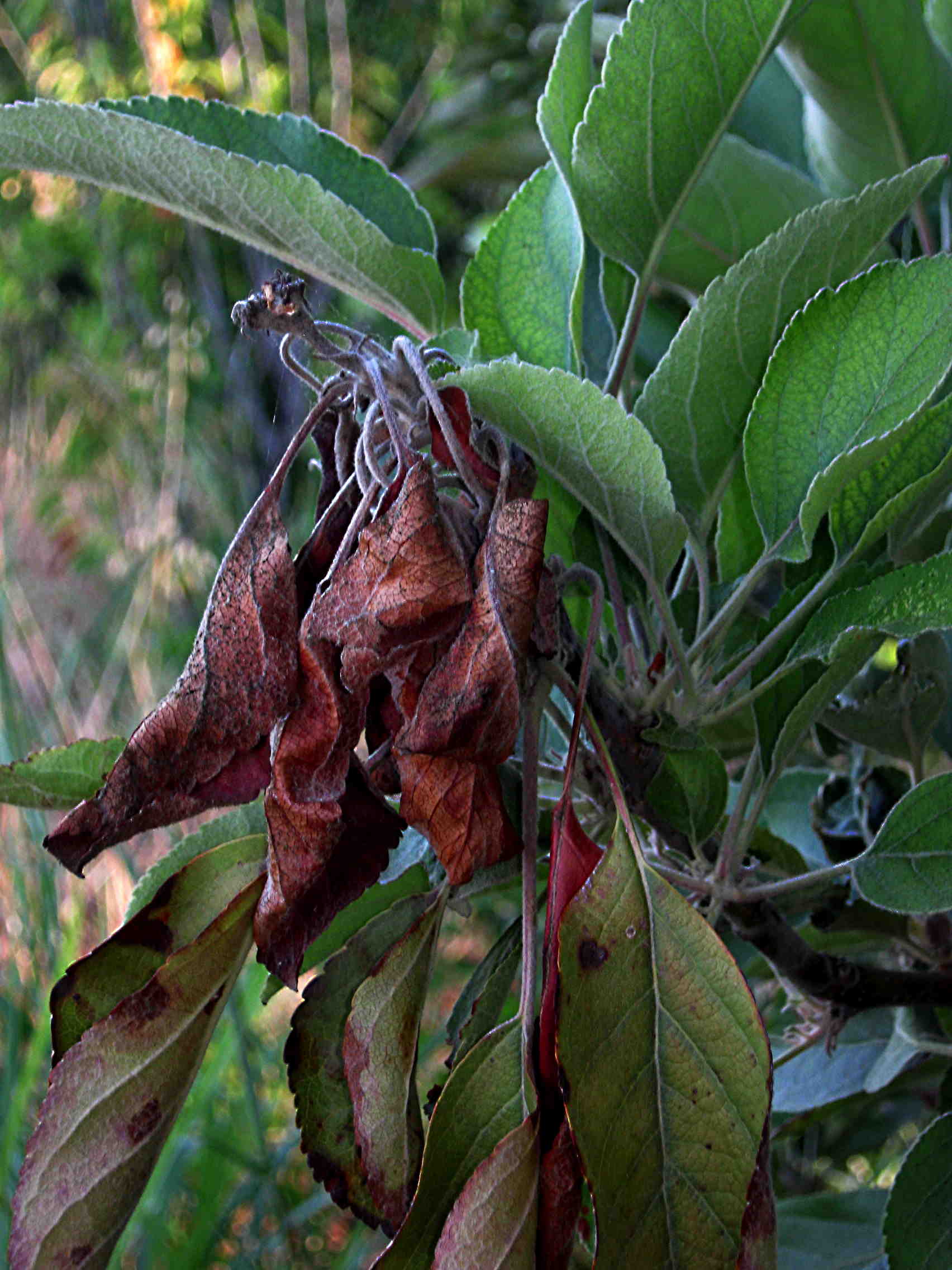 The first photo shows fireblight, a bacterial disease of apples, crabapples, pears, and related plants, killing a shoot about 24 hours after infection. The second photo shows typical infection after a couple of weeks. Prune out affected portions, cutting back all the way into healthy new wood.
The first photo shows fireblight, a bacterial disease of apples, crabapples, pears, and related plants, killing a shoot about 24 hours after infection. The second photo shows typical infection after a couple of weeks. Prune out affected portions, cutting back all the way into healthy new wood.
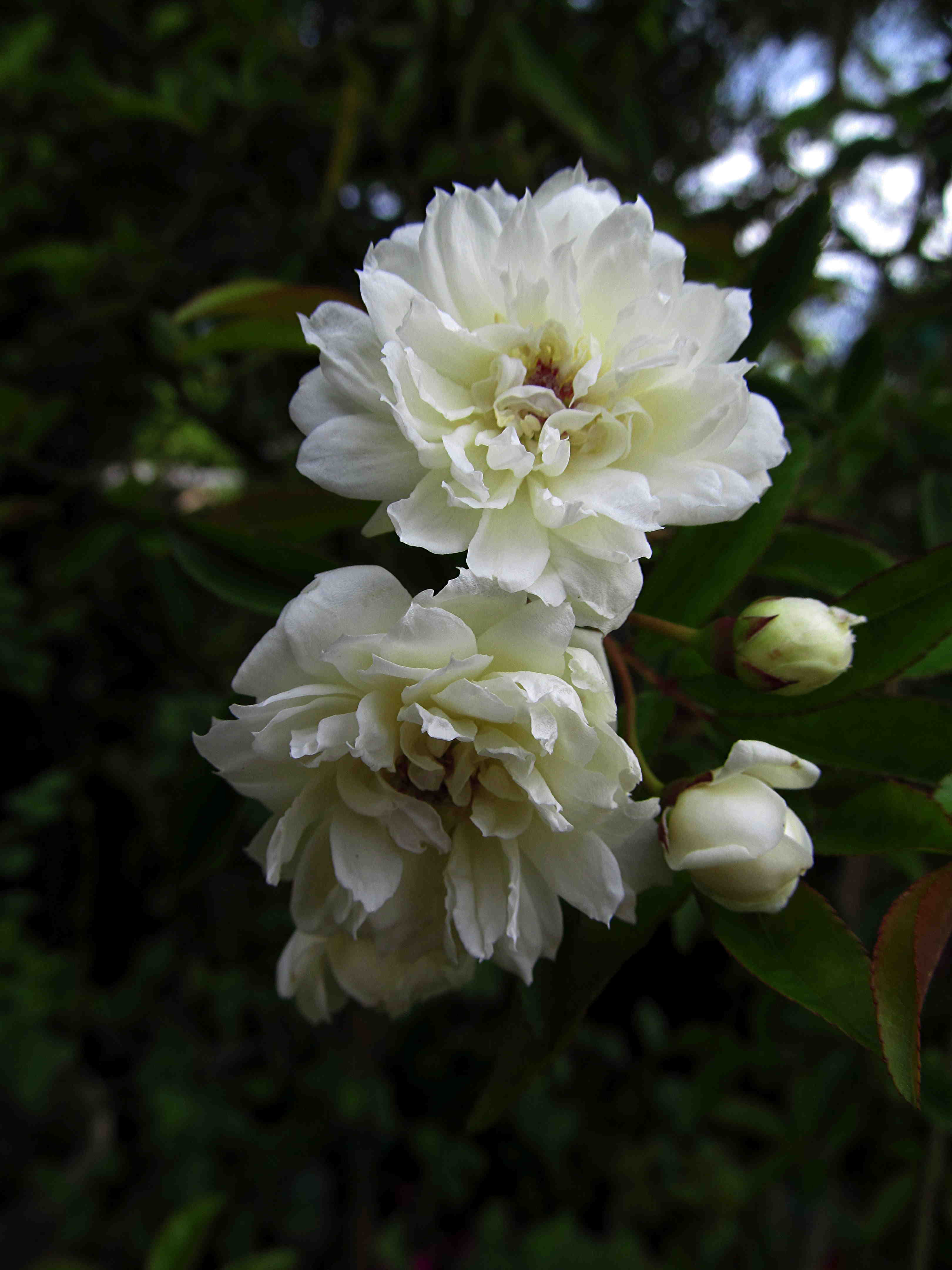 Rosa banksia 'Alba Plena'
Rosa banksia 'Alba Plena'
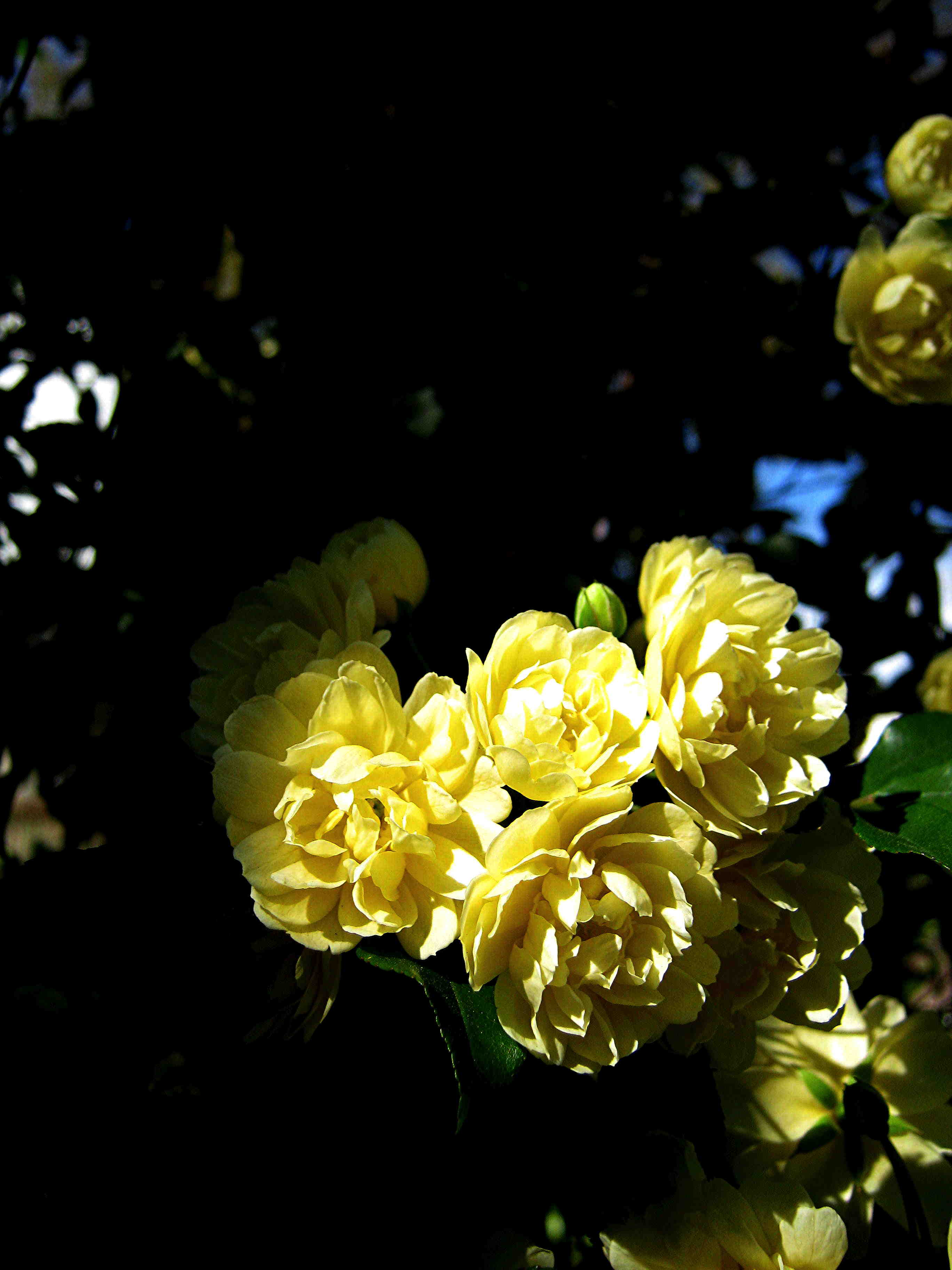 Rosa banksia 'Lutea'
Rosa banksia 'Lutea'
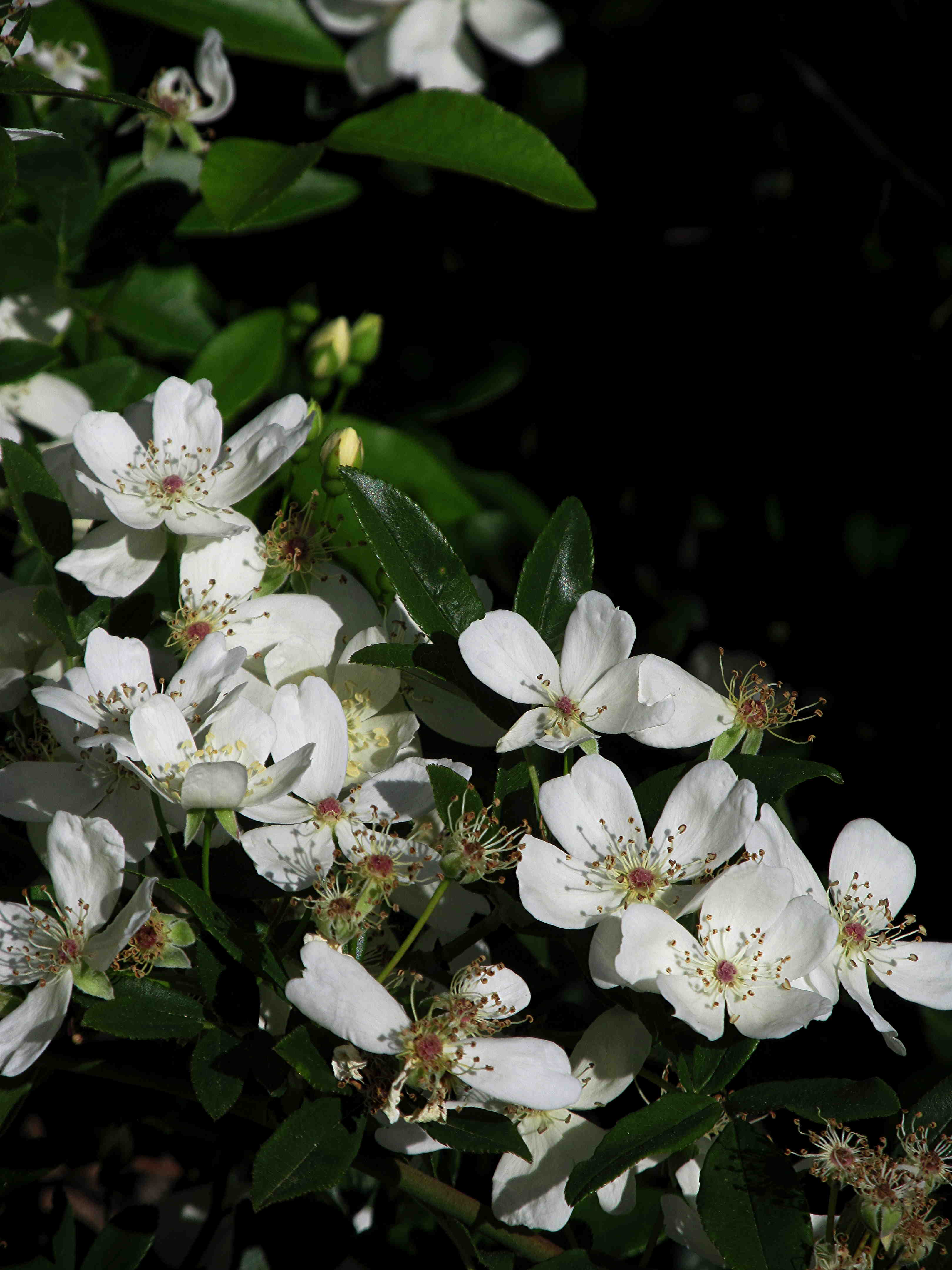 Rosa banksia 'Normalis'All forms of Rosa banksia are vigorous vines that can climb all the way up a tree, cover a long section of fence, or cover an arbor. The bloom is fleeting, just a couple of weeks, but the spectacle and the fragrance make it worthwhile. And it is a tough, drought-tolerant, pest-free rose.
Rosa banksia 'Normalis'All forms of Rosa banksia are vigorous vines that can climb all the way up a tree, cover a long section of fence, or cover an arbor. The bloom is fleeting, just a couple of weeks, but the spectacle and the fragrance make it worthwhile. And it is a tough, drought-tolerant, pest-free rose.
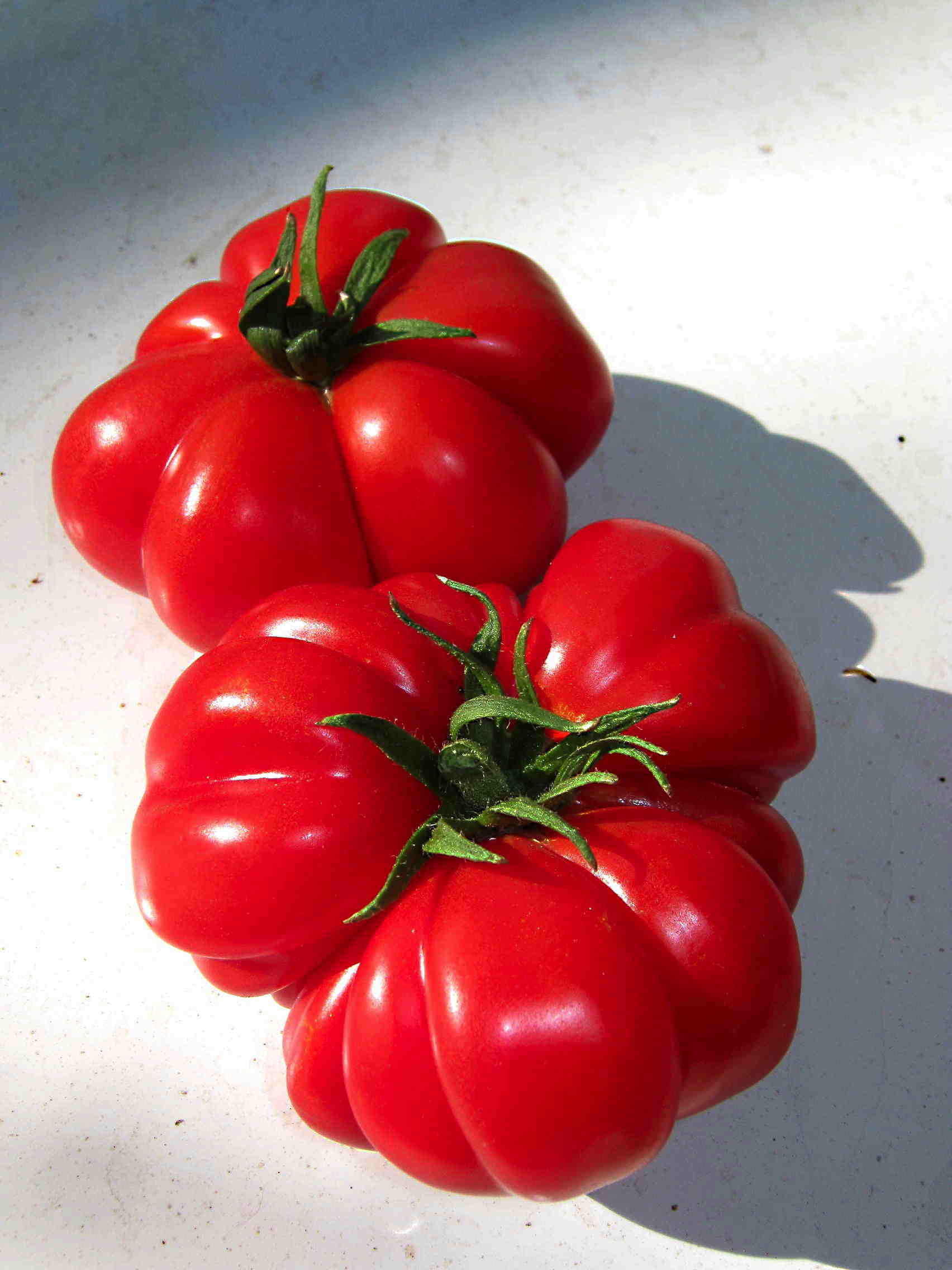 Costoluto Genovese is a beautiful heirloom tomato grown for rich flavor and meaty texture; great for cooking.
Costoluto Genovese is a beautiful heirloom tomato grown for rich flavor and meaty texture; great for cooking.
Some quirky garden questions for early spring!
While we wait for the nights and soil to warm up so we can really get going on our summer gardens, let's deal with some quirky garden questions that have come our way over the last few weeks.
Can I grow that Sumo mandarin I'm seeing in the grocery store?
No. The company that has trademarked that name presently controls all the trees that are in production.
Sumo is an unusually large, sweet, seedless, easy-to-peel mandarin variety that has shown up in stores in the last year or two. It is a cross between a tangor (itself a mandarin/orange hybrid) and another unusually large mandarin called the ponkan. In Japan, where it originated, the variety is officially called Shiranui, and is marketed as Dekopon, which apparently means “bumpy ponkan.” You can see why the US marketer decided to rename it.
Nugget Market has featured them for the last few weeks. Very attractive fruit, they're also pretty pricey; the last ones I bought were about $1.50 each. The flavor is like the Satsuma mandarin, but even sweeter.
A citrus grower went to Japan, imported the budwood, paid to have it put through the costly and laborious process of quarantine and tree production. All of that budwood was purchased by the Griffith family, wealthy Southern California developers who, ironically, made their family fortune by developing citrus groves in Orange County into houses. They have licensed the Sumo growers such that the trees are not available. They don't have it patented, so in theory you could go to Japan and get some of the budwood of this variety and import it, get it quarantined, and start grafting your own trees in a few years. Then you would have trees in production, but at that point you couldn't call it Sumo because they have that name trademarked. So they got a good head start on this crop; the original budwood was imported in 1998. Bottom line: you aren't going to see Sumo mandarin trees in any nursery any time soon.
Can you grow a lemon from a seed?
Surprisingly, yes. Not the Meyer lemon, but regular or 'true' lemons will usually come true from seed. They may take several years to begin flowering and fruiting, though, and will be unbelievably thorny when they're young. It's faster and a lot easier to buy a grafted tree.
While we don't plant most fruit trees from seed, preferring to graft clones in order to get reliable types and earlier fruit production, many citrus will form seeds that are basically little un-fertilized clones of the parent. They aren't cross-pollinated and will make babies that are just like the mother.
To use the technical jargon:
Highly monoembryonic citrus types will produce zygotic monoembryonic seeds that will not come true to type. That includes kumquats, Meyer lemon, pummelo, Bearss lime, and Clementine mandarin (as well as some other mandarins). If you grow these from seed, you won't know what you're going to get.
Highly polyembryonic citrus types will mostly produce nucellar polyembryonic seeds that will grow true to type. This includes most other citrus: Key lime, grapefruit, navel and blood oranges, Satsuma mandarins and many other types, and true lemons such as Eureka. But remember, it'll be quite a while before you'll get fruit.
Why don't my tomato seedlings look as good as the ones from garden stores?
Greenhouses provide much brighter light, much higher temperatures, and better air movement than you can provide indoors, even under grow-lights. Commercial growers fertilize seedlings after the first transplanting with pretty high nitrogen, usually from synthetic sources.
Tomato seedlings you grow indoors tend to sprawl toward the light and get leggy. Make them sturdier by moving them outside during the day, and then back in at night. Movement by the breeze outdoors will cause the plants to release internal hormones that thicken their stems. And it's ok to plant leggy tomato plants: just plant them deeper, and they'll actually root right out of the buried part of the stem.
Cross-pollination questions.
If you plant a lemon near an orange, will it make the oranges sour?
No. Cross-pollination doesn't affect the fruit.
If you plant a hot pepper near a sweet pepper, will it make the sweet pepper hot?
No. Cross-pollination doesn't affect the fruit.
If you plant popcorn or ornamental corn near sweet corn, will it make the sweet corn tough?
Yes! In the case of corn, it is the seed we are eating. Pollen from popcorn, ornamental corn, and feed corn will cause some tough, chewy kernels in your ear of sweet corn.
Cross-pollination issues only arise when we are harvesting the seed. In most cases we're harvesting and eating the fruit.
Why are violets so hard to get rid of?
Today's botanical word is cleistogamy: the condition of self-pollinating plants that form seeds in a flower that doesn't open. Sweet violets (Viola odorata) start the season with showy, fragrant, sterile flowers. Then when weather warms the flower buds just push directly into the ground and set seed. You can pull out all the violets in your lawn, or spray them with an herbicide, and a whole new crop of violet seedlings will promptly sprout to take their place.
Another cleistogamous plant is the peanut.
Someone is selling rose seeds on the internet. Can you grow roses from seed?
Unlike the lemon example above, roses will not come true from seed. That is, nobody can guarantee what the flowers will look like. So those people are ripping you off if they make any promises whatsoever about the quality of what you are growing.
Can we grow citronella plants to repel mosquitoes?
Lots of plants contain citronella, which smells like Lemon Pledge and is reputed to repel mosquitoes. Usually it is in products that are rubbed on the skin. The Citrosa plant, in particular, is a lemon-scented geranium (a Pelargonium species) with a very high concentration of citronella in the leaves. It is easy to grow, but tends to freeze in the winter here, usually recovering in spring. It smells great when you brush or crush a leaf, but it was found to be ineffective in repelling mosquitoes. Maybe if you smear the leaves on yourself?
Why didn't my yellowjacket trap catch any yellowjackets?
Because you don't have yellowjackets. You probably have paper wasps or mud wasps. Yellowjackets are attracted to the lure in the trap, as well as to cured meats that you might have put in there. Those other types of wasps are not. They are also, fortunately, not as aggressive. You can probably co-exist with them. Yellowjackets are far less common here than paper wasps and mud wasps.
What is happening to my apple tree? It looked great, but now it looks like parts of it are dying!
Fireblight is a fast-moving bacterial disease that causes rapid dieback of certain fruit trees and their relatives. Apples, pears, hawthorn trees, pyracantha, and a few others are vulnerable. It has a very narrow temperature range for infection, and requires high humidity. Perfect conditions prevailed here on March 31. Above about 80 degrees, it stops infecting. Prune it out as soon as the points of infection are apparent.
I saw a Lady Banks rose that was white. Isn't Lady Banks rose yellow?
Rosa bankia is a species rose (i.e., a wild rose) that comes in four forms. Lutea is yellow with double flowers. Alba Plena is white with double flowers. Normalis is white with single flowers, Lutescens is yellow with single flowers, and these two are rare in the nursery trade. (Double and single refer to the arrangement of petals: a double or single row of petals).
The blossoms have a fragrance that is sometimes described as smelling like sweet violets, or cotton candy, or both, and the perfume drifts for quite a distance in the evening.
Lady Banks rose is covered with blooms for about two weeks in the spring. It clambers up trees, along fences, over houses, as much as forty feet. Pretty overwhelming, it is an evergreen vine that provides quick screening and privacy, but may be a bit large for the average yard. You can prune it back right after it finishes blooming.
Fortunately, given how big it is, the true Lady Banks rose has no thorns. Unfortunately, there is an impostor out in the marketplace: "Rosa banksia Snowflake" looks a lot like the double flowered white Lady Banks. It continues to flower over a longer season. But it's really, really thorny. It's a different species entirely.
Are there really male and female peppers?
From the internet, especially on various food blogs recently:
"DID YOU KNOW ...
To flip the bell peppers over to check their gender. The ones with four bumps are female and those with three bumps are male.
The female peppers are full of seeds, but sweeter and better for eating raw and the males are better for cooking."
Sigh. Peppers have no gender. In fact, fruit has no gender. There is simply no basis for this whole thing. It wouldn't bother me, except that I now expect people to head into garden centers to ask for male or female pepper plants. There's no such thing.
If you could only plant five tomato plants, which ones would you plant?
Only five tomato plants! What is this, purgatory? Ok, here are some current and long-time favorites:
Early Girl
Costoluto Genovese
Juliet or SunGold
Champion
Pineapple or Pork Chop
And the soil is almost warm enough for them!
© 2013 Don Shor, Redwood Barn Nursery, Inc., 1607 Fifth Street, Davis, Ca 95616
www.redwoodbarn.com
Feel free to copy and distribute this article with attribution to this author.
Click here for Don's other Davis Enterprise articles
